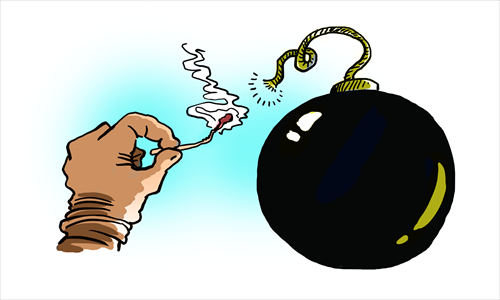North Korea may pull back from brink

Editor's Note:
North Korea's top military body has pledged to carry out a higher-level nuclear test aimed at its "arch-enemy," the US, in response to the UN's sanctions of its latest missile launch. Will North Korea carry out a third nuclear test? Is it possible to resume the Six-Party Talks? Several experts shared their views on these issues at a symposium held by the Russian International News Agency Tuesday.
Pyongyang wants security
Alexander Zhebin, director of the Center for Korean Studies with the Russian Academy of Sciences
Unless the other countries provide substantial guarantees to the security of North Korea, the Six-Party Talks will not make any significant progress.
North Korea first declared it would develop a nuclear program in the late 1980s, when it realized that the Soviet Union and China could not really guarantee its security.
The Iraq War gave a further boost to the idea. The US paid little regard of the UN Security Council's resolutions, which made North Korea feel that even the international law could not provide it with security guarantee.
The Six-Party Talks, which started in 2003, have been deadlocked since 2008. The US' unwillingness to hold talks with North Korea on the basis of equality has also exacerbated the current crisis.
On the one hand, the US is reaching out a hand of cooperation, but on the other hand, it is imposing sanctions on North Korea.
A joint statement adopted in September 2005 at the fourth round of the Six-Party Talks put forward some basic principles on the denuclearization of the Korean Peninsula, but the US was imposing new sanctions at the same time.
The international community is actually adopting a double standard toward the North Korea nuclear programs. Both India and Pakistan test-fired a nuclear-capable ballistic missile in April 2012, and they have not even joined the Treaty on the Non-Proliferation of Nuclear Weapons.
However, the missile launches of the two countries have not received much criticism from the international community.
If North Korea really conducts a third nuclear test, the other countries should adopt a more pragmatic way to deal with the problem.
All the parties concerned will have to acknowledge North Korea's rights to peacefully develop nuclear programs and to peacefully explore space, and they can use the acknowledgement as leverage to persuade North Korea to abandon nuclear weapons.
I think such reconciliation is very likely to be achieved.
Food not nukes
Su Hao, director of the Asia-Pacific Research Center at the China Foreign Affairs University
North Korea's intention to develop nuclear programs is not only out of security concerns, but also to reinforce its regime under the young leader Kim Jong-un.
The country has been hoping to set 2012 as the year when it could start growing into a powerful and prosperous country. Launching a missile is seen as the most effective and timely way to achieve the goal.
The goal of launching missiles was also put forward by Kim Jong-il. It will add to the legitimacy of the current regime if North Korea fulfills the wish of its deceased leader.
However, it will result in tremendous turmoil to the already teetering security situation of Northeast Asia if North Korea really carries out the third nuclear test. It may also give rise to a domino effect in other countries, such as Japan, where some politicians have already clamored to acquire nuclear weapons.
Moreover, North Korea's immature nuclear technology is a big concern for its neighboring countries.
However, I don't think it is very likely for North Korea to carry out the third nuclear test, because an extremely pressing threat for the country's security does not exist for the moment, and its purpose of reinforcing the regime has largely been achieved through launching a missile in December 2012.
North Korea's current hard-line rhetoric is in response to the UN Security Council resolution, and I believe it will seriously elaborate whether there is a need for a third nuclear test, since the move will bring a great destructive impact to the safety of Northeast Asia.
The young leader Kim Jong-un, who believes food is more important than bullets, is placing more emphasis on the economic development than the former leadership. It also threatens a regime if too many people are starving.
All parties concerned have realized that a deteriorating security situation in Northeast Asia is doing no good to any of them. It is very likely that South Korean President-elect Park Geun-hye, who hopes to ease the tensions between the two Koreas through dialogue, will play a positive role on the matter.
China, on the basis of maintaining normal bilateral ties with North Korea, should help with its economic development and guide the country to adopt an opening-up policy.
A prosperous North Korea would be more confident, and would also adopt a more positive attitude on the issue of abandoning nuclear programs.